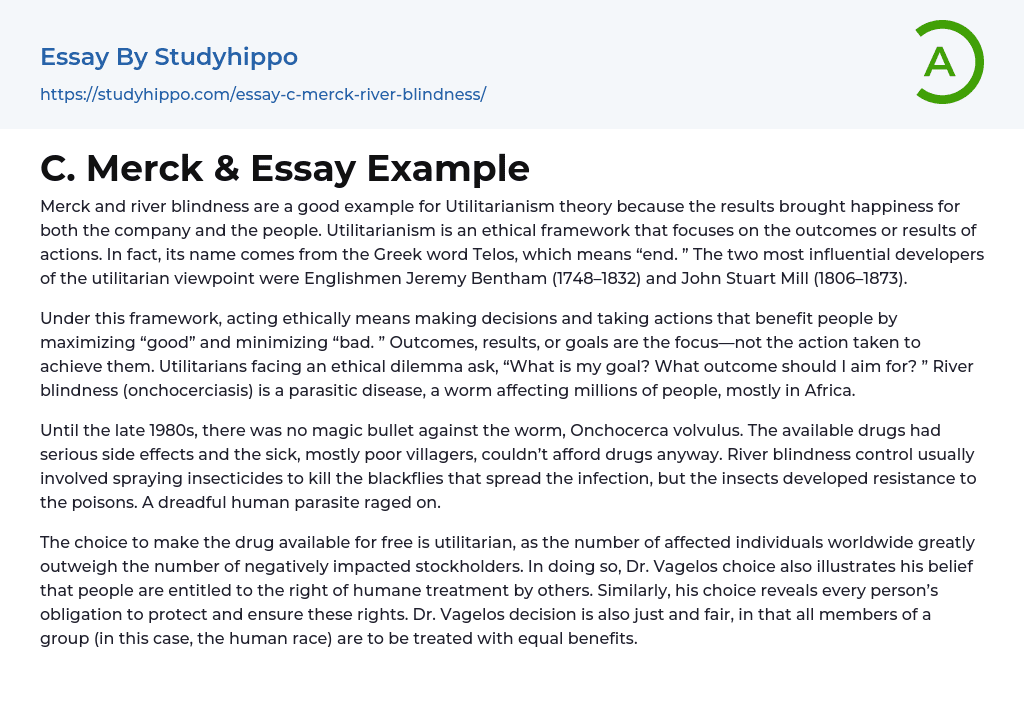The Merck and river blindness case exemplifies Utilitarianism by bringing happiness to both the company and the people. Utilitarianism, derived from the Greek word Telos meaning "end," is an ethical theory that prioritizes action outcomes. Jeremy Bentham (1748–1832) and John Stuart Mill (1806–1873), influential English thinkers, are key proponents of Utilitarianism.
The ethical framework suggests that acting ethically means prioritizing the maximization of "good" and minimization of "bad" in decision making and actions. The focus is on attaining desired outcomes, results, or goals rather than the approaches used to reach them. When confronted with an ethical dilemma, utilitarians question their aim and the result they should aim for. River blindness (onchocerciasis), a parasite-induced disease, impacts millions of people mainly in Africa.
The worm, Onchocerca volvulus, posed a difficult issue u
...ntil the late 1980s. Effective medications were lacking and the existing ones had significant side effects. Moreover, the medication cost was too high for the impoverished villagers who suffered the most. The approach to treating river blindness often entailed using insecticides to eradicate the blackflies that transmitted the infection. Nevertheless, these insects eventually built up resistance to the toxins. As a result, this detrimental human parasite continued to thrive without control.
The decision to provide the drug without cost is grounded on utilitarian principles, prioritizing the global population of affected individuals over a limited group of stockholders who might suffer negative consequences. Additionally, this decision reflects Dr. Vagelos' belief in the significance of offering humane treatment to others and highlights the duty of every person to safeguard and uphold these rights. Furthermore, Dr. Vagelos' choice is fair and unbiased, guaranteeing tha
all members of mankind receive equal advantages.
- Values of Life essays
- Ethical dilemma essays
- Normative Ethics essays
- Virtue Ethics essays
- Belief essays
- Deontology essays
- Moral essays
- Virtue essays
- Work Ethic essays
- Acceptance essays
- Age Of Enlightenment essays
- Child Observation essays
- Confucianism essays
- Conscience essays
- Critical Reflection essays
- Destiny essays
- Determinism essays
- Empiricism essays
- Environmentalism essays
- Epistemology essays
- Ethics essays
- Ethos essays
- Existence essays
- Existentialism essays
- Fate essays
- Free Will essays
- Functionalism essays
- Future essays
- Good And Evil essays
- Human Nature essays
- Individualism essays
- Meaning Of Life essays
- Metaphysics essays
- Natural Law essays
- Personal Philosophy essays
- Philosophers essays
- Philosophy Of Life essays
- Political Philosophy essays
- Pragmatism essays
- Reality essays
- Relativism essays
- Teaching Philosophy essays
- Time essays
- Transcendentalism essays
- Truth essays
- Utilitarianism essays
- Experiment essays
- Explorer essays
- Hypothesis essays
- Observation essays




